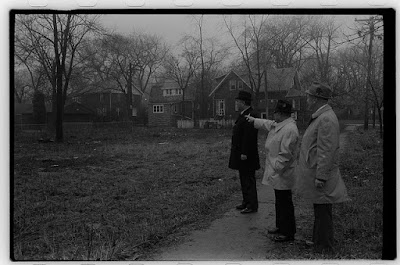I'm reading this wonderful book from 1975: Don't make no waves ... don't back no losers by Milton Rakove. The book is a great mirror for our times. It does not give answers but it puts things in perspective. I like its musings on political philosophy and "Realpolitik". Something resonates with our times. See the quotes below. The earlier parts of this series are 1:Voters, 2:Power, 3:Immigration, 4:Religion, 5:Segregation and 6:The Irish.
Political philosophy
While he has never been a student of philosophy, there are basic philosophic values and maxims that have guided Daley the politician throughout his political career. Those values and maxims are:
- conservatism,
- parochialism,
- loyalty,
- tolerance,
- uncompromising morality (by his standards),
- acceptance of responsibility,
- attention to details,
- hard work, and
- a cautious skepticism about the trustworthiness of his fellowmen.
Daley's conservatism is the old-line Irish Catholic acceptance of a world in which life is harsh, problems are normal, man is sinful, and struggle and hard work are necessary to obtain a foothold in this world and to improve one's status in society.
Daley's personal political philosophy is ... a kind of pragmatic approach to man and society which recognizes both the goodness and the evil of man, which is tolerant of the evil and cognizant of the good, and which accepts travail as a normal concomitant of man's existence on earth.
Self sufficiency
To survive in this world, men have an obligation to lift themselves up by their own bootstraps. But they also have a responsibility to help their fellow men who have not been successful in running the race through life but who have tried hard and done their best to make the most of themselves.
Daley has little sympathy for those who do not try to raise themselves up, who are content to live off the sweat of the brows of their fellowmen, and who thus become an unwarranted burden on those who are carrying their fair share of the load. "Look, Sister," he told a Catholic nun who complained to him about the plight of blacks in the ghetto, "you and I come from the same background. We know how tough it was. But we picked ourselves up by our bootstraps.'
The Marxist concept of "From each according to his ability, to each according to his need" is totally alien to Daley's outlook toward society and its problems. Rather, Daley might say, "To each according to his ability, and to those in need who have striven to help themselves."
Unavoidable hardships
... "Certain ills belong to the hardships of human life. They are natural. They are part of the struggle with Nature for existence. We cannot blame our fellow-men for our share of these. My neighbor and I are both struggling to free ourselves from these ills. The fact that my neighbor has succeeded in this struggle better than I constitutes no grievance for me. Certain other ills are due to the malice of men, and to the imperfections or errors of civil institutions. These ills are an object of agitation, and a subject of discussion. The former class of ills is to be met only by manly effort and energy; the latter may be corrected by associated effort."The world as a set of neighborhoods
Daley's political style is also affected by his parochialism. He has never left Bridgeport. He conceives his city and world as a series of Bridgeports-communities in which God-fearing, decent, hard-working people strive to keep the community stable, hold onto the values of their fathers, and fulfill their obligations as citizens to the neighborhood, the polis, and the nation. Thus, men in politics should be active in the neighborhood, should concern themselves with those in need 'in the community, and should stay out of other neighborhoods, where the people of those neighborhoods should deal with their own problems in their own way.
The world is a Great Neighborhood made up of diverse peoples, each with their own cultures and customs to be respected, in which peace and prosperity can best be achieved by taking care of one's own problems at home, leaving others to do likewise in their respective neighborhoods. "We are a city of fine neighborhoods" he told a party rally in his first year in office in 1955. Eight years later, he still affirmed his belief in the character of his city. "I have lived in Chicago all my life," he told a press conference, "and I still say we have no ghettos in Chicago."
Loyalty to supporters
Daley's conservatism and parochialism are buttressed by a strong sense of loyalty to the people who are close to him by family ties or blood, to those who have worked for him, and to those who have supported him in times of stress.
Daley's political loyalty, however, transcends rewarding family, friends, and associates. He refuses to criticize or castigate associates and supporters who have become embroiled in' legal or political difficulties. He will always find another spot in government or politics for a loyal supporter who has encountered severe criticism or difficulty in the position he holds. He has an elephant's memory for those who stood up for him or supported him in time of need or stress. But he also has a long memory for those who broke ranks, offered unwarranted criticism, or put their own private interests before the interest of the party or the organization.


No comments:
Post a Comment